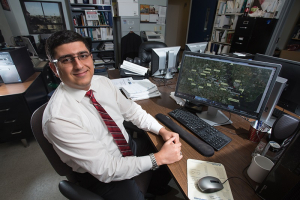As a Ph.D. student in environmental engineering, Amin Kiaghadi already has a patent under his belt and won awards for his idea of how to treat “produced water,” the dirty, non-usable water created during hydraulic fracturing. Now Kiaghadi can add scholarship recipient from Texas American Water Works Association Southeast Chapter to his burgeoning list of credits.
Kiaghadi, from Iran, studies the climate intensely to develop his concepts and chose Houston for his graduate work, also with the climate in mind.
“I hate cold weather,” Kiaghadi said with a big grin. So he narrowed his graduate choices to warmer American cities and Professor Hanadi Rifai, director of the environmental engineering graduate program and associate dean of research and facilities at the college, won him over.
“She’s was a perfect match for my research interests and she is so supportive and generous, even allowing me to file my own patent,” he said.
It seems the sentiment runs both ways.
“Amin is one of the top students in the environmental engineering program,” said Rifai. “He has boundless energy and passion for research and for teaching and I foresee a great academic career in his future.”
Kiaghadi models water quality, using either developed software or programs and codes he writes himself.
Dirty water, a solution and patent
In 2015, the challenge Kiaghadi met was creating a way to utilize the unusable water produced as a byproduct of oil and gas wells and exploration.
“It’s super dirty, super salty – seven times saltier than sea water,” said Kiaghadi. Current practices call for disposal of such water into deep injection wells below the ground. Kiaghadi says that process may just cause more problems and treating that water is too expensive.
So Kiaghadi had a better idea: to use the heat from the earth (geothermal energy) from existing oil and gas wells to treat the water. He and his colleagues developed a process to harness that energy to distill the water.
“Then that water can be used for agriculture or industrial use, and that’s what the patent is about. No one ever thought before about using existing or abandoned oil and gas wells to harness geothermal energy for treating water,” he said.
That could be why Kiaghadi continues to win awards, like this $1500 scholarship.
He’s got other ideas, too, just waiting to be tested. He explains the inequality of water distribution in the world and predicts water to be a major crisis in the next ten years.
“My research emphasis is on water but also the nexus of water and energy, the relationship between the two,” he said. “You cannot separate them nowadays. You need energy to treat that water and you need water to produce energy. You always need both. I’m trying to expand the horizons and come up with new ideas to – I think – save the world.”
He may need another scholarship for that.
